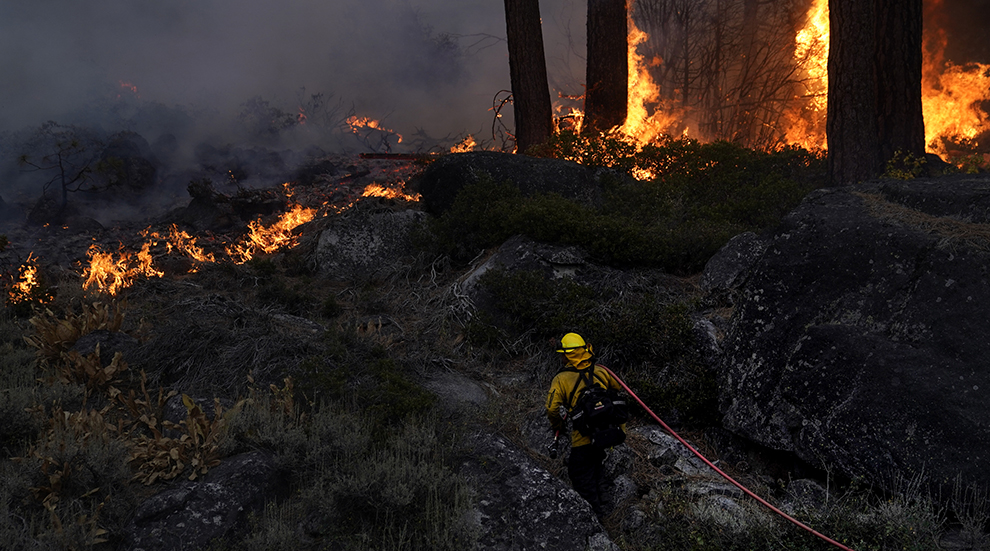Equilibrium/Sustainability — Presented by Southern Company — What a leading biologist says will save humans

Today is Wednesday. Welcome to Equilibrium, a newsletter that tracks the growing global battle over the future of sustainability. Subscribe here: digital-stage.thehill.com/newsletter-signup.
Leading Harvard biologist and conservationist E.O. Wilson is calling for greater global efforts to prevent climate change and save biodiversity, labeling it humanity’s “clear definable goal.”
Wilson, dubbed a modern-day Darwin, launched the Half-Earth project in 2016 calling for protecting half of the planet’s land and seas in order to reverse the course of mass extinction. This project helped inspire the U.N.’s current 30×30 goal — which aims to defend 30 percent of national territories in protected areas by 2030.
Without changing actions and seeking to reverse the twin biodiversity and climate crises, Wilson told Reuters, “the slope of human history will always be downward.”
Wilson, a lifelong entomologist, or specialist in ants, called for an outside-the-box strategy to save to planet, but waved away the suggestion that humans should structure their society based on the habits of other species.
“I’m going to say something daring: to follow the ethics and behavior of most other species would lead us to even more warfare over [resource] utilization,” he told Reuters.
Today we’ll look at a proposal to bring more support to the firefighters battling Western blazes — and whether a boost in resources will make their jobs more doable. Then we’ll consider a proposal that would force banks to treat all new fossil fuel development as inherently risky, in the interest of heading off another 2008-style crash.
For Equilibrium, we are Saul Elbein and Sharon Udasin. Please send tips or comments to Saul at selbein@digital-stage.thehill.com or Sharon at sudasin@digital-stage.thehill.com. Follow us on Twitter: @saul_elbein and @sharonudasin.
Let’s get to it.
Lawmakers push for boost in firefighter pay

Democrats — and select Republicans — voiced their support for a bipartisan bill that would boost wildland firefighter pay and reclassify their job titles during a House subcommittee hearing on Wednesday.
“Wildfires today are really a year-round risk burning larger areas at higher intensity, and this is only projected to increase as the climate continues to warm,” said Rep. Joe Neguse (D-Colo.), who chairs the Subcommittee on National Parks, Forests and Public Lands.
“While Congress has acted to increase the budget for wildfire suppression, we have neglected to prioritize the well-being of those on the frontlines of these climate driven disasters — our brave, federal wildland firefighters,” he added.
Raising pay, allowing overtime: Wednesday’s hearing was focused on the Tim Hart Wildland Firefighter Classification and Pay Parity Act — co-sponsored by Neguse and Reps. Liz Cheney (R-Wyo.), Katie Porter (D-Calif.) and Salud Carbajal (D-Calif.) — which would raise pay and address the classification of wildland firefighters.
The subcommittee was also considering a second bill, Rep. Zoe Lofgren’s (D-Calif.) Wildland Firefighter Fair Pay Act, which would waive limitations on overtime and premium pay.
‘Tim’s Act’: The first bill — also known as “Tim’s Act” — is named for Tim Hart, a smokejumper from Wyoming who lost his life in May while battling the Eicks Fire in New Mexico.
The act, introduced last week, would raise pay to at least $20 per hour, improve health care and mental health services, provide a week of mental health leave, ensure retirement benefits for seasonal temporary work and provide both housing stipends and tuition assistance. The legislation would also establish a federal wildland firefighter classification category, so that firefighters are distinguished from other forest technicians for their dangerous duties.
Cheney, who called into the hearing briefly from the road, stressed the importance of bringing wildland firefighters “the kind of commitment they need through adequate pay and salary,” while ensuring “that we recognize the real danger that they face and the sacrifices that they make to keep us safe.”
A MESSAGE FROM SOUTHERN COMPANY
At Southern Company, we achieved our interim net zero energy goal ten years early. Today, we continue our work toward a net zero future.
GRAPPLING WITH FIREFIGHTER WELLBEING
Resources stretched thin: Rep. Russ Fulcher (R-Idaho), ranking member of the subcommittee, agreed that “federal wildland firefighters have been stretched incredibly thin” and that the bills could “address necessary compensation and support services.”
Nonetheless, Fulcher criticized the subcommittee’s leadership for failing to hold hearings on the management of public lands and forests — noting that it would be impossible to “truly address wildland firefighter wellbeing” without aggressively scaling up the “management warranted to rein in this historic wildfire crisis.”
Republicans maintain that management is key. Rep. Bruce Westerman (R-Ark.), ranking member of the Natural Resources Committee, likewise expressed his support for “paying our firefighters more,” but stressed that “we should also manage our forest so that we don’t have to lose another brave hero like Tim.”
“We need to actively manage our forest — a reality that Democrats on this committee have gone to unbelievable lengths to deny,” Westerman said.
But these efforts are already underway, according to Neguse. The Natural Resources Committee, he noted, held a hearing earlier this year on his Joint Chiefs Landscape Restoration Partnership Act, which would help increase funding available to the Agriculture and Interior Departments to conduct broader treatments in fire prone regions.
Examples of hazardous fuel treatment typically include techniques like thinning, pruning, removing fuels and conducting controlled burns.
Neguse also said that President Biden’s bipartisan infrastructure bill includes a $50 billion investment in the country’s forests.
But effective land management may in turn require more firefighters. Due to the intensity and duration of today’s year-round fire season, conducting fuel treatment and prescribed burns has become increasingly difficult, according to Jaelith Hall-Rivera, deputy chief of State and Private Forestry at the U.S. Forest Service.
Employees who would have been assigned this preventative work are now busy putting out fires, she said. To bridge this gap, she explained, the Forest Service needs more permanent firefighters, and particularly those trained in 21st century firefighting technologies.
Last words: “We absolutely need to grow our firefighting crews so that people can take time off so that they can have a work-life balance,” Hall-Rivera said.
To read the full story, please click here.
Advocates warn of fossil fuel investment risk

Big banks are at risk of a failure reminiscent of the 2008 financial crisis over their continued investments in oil and gas development, which are at odds with global climate commitments, an international group of academics and advocates warned.
Brussels-based Finance Watch wants national financial regulators — like the Federal Reserve and Bank of England — to require banks to hold more cash to offset loans to all oil and gas developments, but particularly new ones.
Background: New fossil fuel developments are risky because the world already has more fossil fuels than it can safely burn. At least 60 percent of oil and natural gas, along with 90 percent of coal, must stay in the ground to keep warming under 1.5 Celsius (2.7 Fahrenheit), according to September study in Nature.
Risky business: That means central banks should treat any new investment in fossil fuels as a high-risk investment and be required to balance every dollar they invest in new fields and coal mines with a dollar in cash reserves, according to the letter.
Those capital requirements aim to mitigate risk both from the role these developments play in worsening the climate crisis, and because they’re inherently risky themselves: “at risk of being stranded,” Benoit Lallemand of Finance Watch, the advocacy group that wrote the letter, told Equilibrium.
“The risk is so high, you should assume that 100 percent of those assets could be lost,” Lallemand said.
Stranded assets: Stranded assets are in investments that no longer bear a return and that no one wants to buy — which can happen suddenly, such as on Sept. 15, 2008, when the sudden collapse of the firm Lehman Brothers triggered a market panic that tipped the global financial system deeper into financial crisis.
Worse than a tragedy, this was a surprise. “Finance is based on expectations, and if risks materialize beyond anyone’s expectations, you’ll have some level of market panic,” Phillip Basil, signatory to the letter and director of banking policy at the advocacy group Better Markets, told Equilibrium.
THE ‘LEHMAN MOMENT’
Better Markets banking policy director Phillip Basil said that before the Lehman collapse plenty of people knew the financial system was deeply invested in very risky investments — particularly an alphabet-soup of financial products built on home mortgages.
“Some people were talking doom and gloom, but I don’t know if there’s a single person that called just how bad [the 2008 crash] did get,” Basil said.
The collapse of Lehman pulled the scales from everyone’s eyes, revealing to traders, bankers and investors that conditions were “significantly worse than anyone thinks, and that fundamentally shifted expectations” in a way that further crashed the market, according to Basil.
Avoiding compound crises: This is what Finance Watch and its signatories want to avoid.
Imagine that in “2022 or 2023, all of a sudden the climate looks a lot worse than anyone was predicting,” Basil said.
Perhaps that comes from a series of acute climate disasters or a rapid uptick in warming — or the market wakes up to the discrepancy between all the fossil fuel reserves in the ground and the likelihood that they can never be sold and burned.
“And all of a sudden people are panicking, and the market is panicking, And then you could have the kind of rapid deterioration in not only asset prices but economic activity that we saw in 2008.” Basil told Equilibrium.
Except it could be worse: A loss of faith in fossil fuels or a climate-driven financial crisis would likely hit the government just as much as the financial sector, forcing regulators to react under pressure to a crisis that constricts their ability to respond — even in the face of a worsening crisis, Lallemand of Finance Watch told Equilibrium.
Last words: “We are saying to regulators, ‘Don’t add a financial crisis to a climate crisis,’ ” Lallemand said, because “if you have a climate crisis, your resources will be stretched to say the least.”
A MESSAGE FROM SOUTHERN COMPANY
At Southern Company, we achieved our interim net zero energy goal ten years early. Today, we continue our work toward a net zero future.
World Wednesday

A tour around the world to see how sustainability issues are affecting different countries and regions.
Greenpeace urges Europeans to swap short flights for trains
- More than one-third of the busiest short-haul flights in Europe have train alternatives that generate far less pollution, The Associated Press reported, citing a report commissioned by Greenpeace.
- Greenpeace called on European governments to promote train travel, after determining that 34 percent of the 150 busiest short-haul flights have train alternatives of six hours or less, according to the study, conducted by OBC Transeuropa.
- “Europe could replace almost all of the top 250 short-haul flights and save some 23.4 million tons of CO2 per year, as much as the annual CO2 emissions of Croatia,” Greenpeace told the AP.
Queen Elizabeth skipping COP26, but royal presence remains strong
- After her brief stay in a hospital last week, 95-year-old Queen Elizabeth II will be skipping next week’s U.N. Climate Change Conference (COP26) in Glasgow, but will still make a video address, according to CNN.
- A few weeks ago, the Queen had been overheard saying that the lack of action on combating the climate crisis was “irritating,” CNN reported.
- But Prince Charles will be delivering the opening address at COP26, attending the event with his wife Camilla, Reuters reported. Charles has spent most of his life advocating for environmental issues and said earlier this month that he shares the concerns of Greta Thunberg with regard to climate action, according to Reuters.
- Also attending will be Charles’s son Prince William and his wife Kate, who have also been speaking out about green issues, Reuters reported.
Bad weather, rising energy prices spike food prices in China, France
- Heavy rains have flooded the vegetable-growing Chinese province of Shandong, leading to an alarming rise in the cost of staples like spinach, broccoli, cucumber and cabbage, according to Reuters.
- “All the vegetables are dead in the ground,” farmer Zhou Rui tol Reuters. This phenomenon has multiplied across an entire agricultural region — and added to a rise in energy prices that has raised prices to run greenhouses, Reuters reported.
- These trends have combined to make wholesale vegetable prices in Beijing climb 40 to 50 percent in a month — rising above the price of pork, China’s staple meat.
- Meanwhile in France, baguette prices are climbing behind rising European energy prices and bad wheat harvests in Russia, The Associated Press reported.
- They’re only up 4 to 6 cents — which is still “a huge increase,” as Dominique Anract, president of the French Confederation of Bakeries and Pastry Shops, told the AP.
- “The baguette is precious. It has only gone up 23 centimes [27 cents] in the last 20 years,” Anract said.
Please visit The Hill’s sustainability section online for the web version of this newsletter and more stories. We’ll see you on Thursday.{mosads}
Copyright 2023 Nexstar Media Inc. All rights reserved. This material may not be published, broadcast, rewritten, or redistributed. Regular the hill posts








